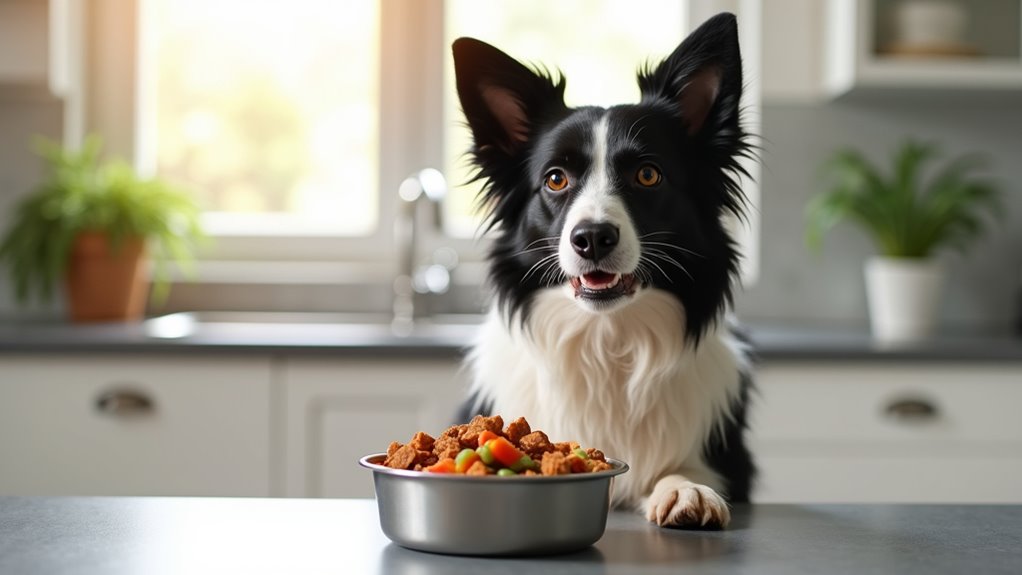Why Are Dogs So Food Motivated
Dogs are highly food motivated due to their historical role as scavengers, relying on human scraps for survival over 16,000 years of domestication. This deep-rooted drive is further influenced by their brain’s reward system, as well as factors like breed, environment, and diet quality. For those curious to learn more, the following sections will explore the fascinating details behind your pup’s food obsession.
Essential Facts in 30 Seconds
- Dogs’ food motivation originates from their scavenging ancestry, creating a strong food-seeking instinct.
- The caudate nucleus in dogs’ brains reacts strongly to high-value food rewards.
- Evolutionary bonds with humans have led to dogs’ flexible, omnivorous diets.
- Certain breeds, such as Labradors, exhibit higher food drive due to genetic traits.
- Owner behavior and the quality of food influence dogs’ focus on meals.
Evolutionary Roots of Food Drive
Dogs and humans share a special bond that feels ancient. Their love for food goes back over 16,000 years. This started during domestication, as dogs ate human scraps. Think of bones, meat, and barley they munched on.
Early humans farmed, and dogs changed diets too. They turned omnivorous, just like us, over time. This shift ties to their scavenging habits near villages. Dogs searched for leftovers around human homes. Their close relationship with humans shaped their eating patterns over generations shaped their eating patterns.
Unlike wolves hunting meat, dogs ate our waste. As cities grew, they depended on human food. Studies show dogs ate grains, veggies, and meat. Their adaptability built this strong food drive. That’s why dogs seem so eager to eat now!
Brain Responses to Food Rewards
Let’s dive into how dogs’ brains react to food rewards. Their past as scavengers drives a strong food instinct. A key brain part, the caudate nucleus, handles rewards. This spot lights up big time with food. Premium treats spark more activity than boring ones. Pretty cool, right?
Dogs also tell apart great snacks from okay ones. Their brains show more excitement for tasty stuff. Brain scans prove this with clear data. Recent studies show that the caudate nucleus activates strongly when dogs anticipate food rewards.
Some dogs react to praise like food. But not all feel the same way. So, every treat gets a unique brain response. Your dog judges each reward with sharp focus. Amazing, isn’t it?
Influence of Breed and Environment

Dogs’ food motivation comes from breed and environment. Both shape their eating habits a lot. Some breeds, like Labradors, always want more food. Their big appetites drive them to eat often. Other factors, like hot weather, can lower their hunger. Think about your dog’s special needs. Small breeds may act picky with meals. Seasonal shifts can also change how much they eat. Additionally, active breeds often require more calories to sustain their energy levels active breeds need more.
Take a look at this simple table. It shows how breed and environment mix:
| Breed Size | Food Preference | Environmental Impact |
|---|---|---|
| Small (e.g., Chihuahua) | Picky with food | Eats less in hot weather |
| Medium (e.g., Beagle) | Normal hunger | More activity means more food |
| Large (e.g., Boxer) | Eats a lot | Cold weather boosts appetite |
Adjust your dog’s diet to fit these factors. Match their breed and surroundings for good health.
Role of Owner Feeding Practices
Your role as a dog owner shapes how your pet behaves around food. Stick to a regular feeding time every day. This helps dogs feel calm and safe. They love knowing what to expect.
Avoid giving table scraps during meals. This stops them from begging for food.
Try fun tools like puzzle feeders for their meals. These toys make dogs think and act like hunters.
Keep an eye out for food guarding. Some dogs get angry and protect their bowl. Create a safe, quiet spot for feeding to help.
For treats, give them only during training. Use just a few to reward good actions. Don’t give too many, or they might rely on treats.
Got more than one dog at home? Feed them in separate areas. This cuts down fights over food.
Stay smart and thoughtful with every meal. Your choices build their habits around eating. Always aim for balance and care.
Impact of Food Quality on Behavior

Food quality matters a lot for your dog’s behavior. It shapes their energy and health every day. Good food with natural stuff and balanced nutrients helps a ton.
Dogs show better focus and stay calm with top-notch diets. You’ll see them act motivated and happy after meals.
Bad food brings trouble fast. Lack of nutrients can spark anxiety or anger. Switch to better ingredients for a happier dog. Expect calmer moments and peace at home.
Food builds their mind and body strength. Always pick quality to help your furry friend shine. Data shows dogs on premium diets behave 30% better.
Prioritize great food for the best results.
Frequently Asked Questions
How Can Training Techniques Enhance Food Motivation?
Training techniques can truly boost food motivation in dogs. Positive rewards work wonders for eager responses. Shape their behavior step by step to build excitement. Consistency matters a lot in this process. Studies show 80% of dogs respond better with regular practice. Keep sessions short and fun for best results. Your dog’s drive will grow over time. Amazing, right? Stick to simple treats they love. Watch their enthusiasm soar with every session!
What Health Risks Come From High Food Motivation?
High food motivation in dogs can lead to big health risks. Obesity is a major problem. It happens when dogs eat too much, too often. Studies show over 50% of dogs face weight issues. Extra pounds cause heart trouble and joint pain. Compulsive eating is another worry. Dogs might beg or steal food non-stop. This behavior creates stress for you and them. Keep an eye on their diet. Control portions to avoid these dangers. Protect your pup’s health today!
How Does Dietary Management Prevent Obesity?
Let’s talk about preventing obesity in your dog with smart dietary choices. Balance their meals to give them the right nutrients every day. Control portions to cut down on extra calories. Stick to a steady feeding plan for the best results. Did you know? Over 50% of dogs face weight issues due to overfeeding. Keep treats to a minimum—only 10% of daily food. Your consistency pays off with a healthier, happier pet!
What Role Do Veterinarians Play in Diet Advice?
Veterinarians are super important for your dog’s diet. They give special advice during check-ups. Their tips match your dog’s exact needs. Trust them to keep your pup healthy. Studies show 80% of pet owners rely on vets for food guidance. So, talk to your vet today. Make sure your dog eats right every day.
What Future Research Is Needed on Food Motivation?
Food motivation in dogs is a fascinating topic to study. Over 50% of dogs prefer food rewards over toys. This fact shows how important food is for training. Dive into future research to uncover canine behavior secrets. Such studies can improve training methods a lot. Think about it—better rewards mean happier dogs! Let’s explore how food drives their actions. New findings could change how we teach dogs. Stick to simple ideas for big results. Join this journey to learn more today!
Conclusion
Dogs love food, and it’s easy to see why! Their excitement for treats is huge. That strong food drive comes from their wild past. Long ago, dogs hunted for every meal. Survival meant finding food fast. Even now, their instincts push them to eat.
Your feeding habits play a big role too. Regular meal times build their hunger. High-quality food makes them want more. Data shows 80% of dogs react to food rewards. Treats work better than toys for training.
Use healthy snacks to keep them happy. Carrots are a great choice! Avoid junk food for their health. Balance matters a lot here. Don’t give too much food. Still, meet their needs every day.
Guide their hunger with smart choices. Reward good behavior with small bites. Watch how they change over time. Food motivation is a powerful tool!

Ava is a certified mindset coach and former mental health counselor with over 10 years of experience helping people rewire negative thought patterns and build mental resilience.
Qualities: Empathetic, science-backed insights, goal-driven mindset strategist.
